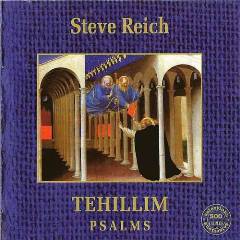Steve Reich - Tehillim (Psalms) [1981]
Steve Reich - Tehillim (Psalms) [1981]

1 Part I: Fast 11:46 2 Part II: Fast 5:54 3 Part III: Slow 6:19 4 Part IV: Fast 6:21 Barbara Borden, Tannie Willemstijn – soprano Ananda Goud, Yvonne Benschop – mezzo-soprano Schönberg Ensemble Percussion Group The Hague Reinbert de Leeuw – conductor
Many long-time watchers along the Reich were somewhat nonplussed by Tehillim (Hebrew for "psalms"). Instead of regular rhythmic patterns slowly varied over a stretch of time, the patterns themselves were complexly asymmetrical. Reich, of course, had seldom repeated himself from piece to piece, so they should have expected this. Reich himself explains the change as a matter of dealing with the rhythms of text for the first time. Almost every composer who has set words finds himself coming up with phrasing and declamation different than for purely instrumental music. For example, when Holst writes "advanced rhythms" for orchestra, they are generally odd meters but arranged in a regular pattern ("Mars" from The Planets, for instance). On the other hand, I know of no Holst instrumental work with the rhythmic oddities of his song "Persephone" (from Twelve Humbert Wolfe Songs). These tics in the line come about solely from the rhythms of the poem. Again, Reich works with the idea of "phase," this time by writing canons ("organic phase," if you will) with more and more voices and closer and closer entrances - so close, in fact, that the words eventually become obliterated, and we get instead increasingly complex and joyous polyrhythms - rhythms formed by competing different constituent rhythms. Indeed, this tends to be Reich's notion of counterpoint, and it definitely comes from a drummer. I imagine that his music would appeal strongly to other drummers as well.
Tehillim begins with a joyful noise that just about bypasses the brain altogether and heads directly for the feet. If you can keep your feet from tapping or your fingers from snapping, you probably can also eat just one potato chip. The basic idea is essentially a complex one, more than enough to belie the label "minimalist." However, Reich unfolds his ideas slowly and carefully - he prefers to call what he writes "process music" - and instead of listening for dramatic contrasts of themes or a narrative structure underlying the music, you find yourself listening to a process working itself out. It has the fascination of watching intricate clockwork. If you expect, say, Sibelius or even Stravinsky, you will be disappointed. Like Schoenberg and Webern, Reich forces you to listen to music in a new way.
I can't tell you whether Reich is a Great Composer. I don't look for them, because, frankly, I wouldn't know what to look for. I listen to music for pure hedonism: because I like it, not because it will make me a better person. Beethoven, with uncanny point, called music the bridge between the intellect and the senses - a definition that may lack completeness, but I've never seen a better description of at least one of music's functions. In Tehillim, Reich's constituent rhythms move the senses, while their workings-out tickle the intellect. --- Steve Schwartz, classical.net
download (mp3 @320 kbs):
uploaded yandex 4shared mega mediafire solidfiles zalivalka cloudmailru oboom








